‘Kurkure’ And ‘Cheetos’ Classifiable As ‘Namkeen’, Not ‘Snacks’ Under VAT Act: Rajasthan High Court
Mariya Paliwala
10 Oct 2023 7:30 PM IST

Next Story
10 Oct 2023 7:30 PM IST
The Rajasthan High Court has held that ‘Kurkure’ and ‘Cheetos’ are classifiable as ‘namkeen’, not 'snacks' under the VAT Act.The bench of Justice Sameer Jain observed that the department neither sought any technical or expert opinion nor brought any evidence on record to prove their point. It appears that the Tax Board merely relied on a basic Google search result wherein the...
